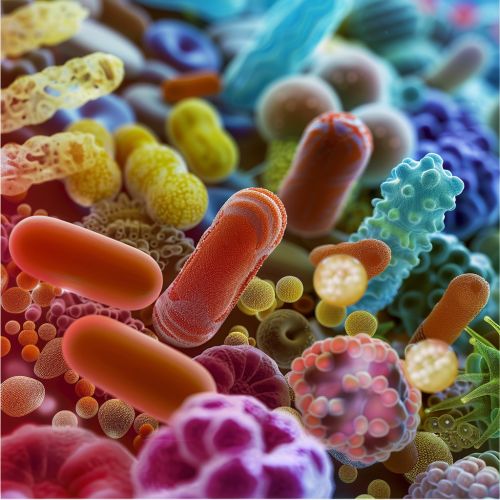Gut microbiota: Difference between revisions
No edit summary |
No edit summary |
||
| Line 5: | Line 5: | ||
The gut microbiota is composed of a diverse range of microorganisms, with bacteria making up the majority. The most abundant bacterial groups include Firmicutes and Bacteroidetes, although Proteobacteria, Verrucomicrobia, Actinobacteria, Fusobacteria, and Cyanobacteria are also present. The composition of the gut microbiota can vary greatly between individuals, and is influenced by factors such as age, diet, and health status. | The gut microbiota is composed of a diverse range of microorganisms, with bacteria making up the majority. The most abundant bacterial groups include Firmicutes and Bacteroidetes, although Proteobacteria, Verrucomicrobia, Actinobacteria, Fusobacteria, and Cyanobacteria are also present. The composition of the gut microbiota can vary greatly between individuals, and is influenced by factors such as age, diet, and health status. | ||
[[Image:Detail-78831.jpg|thumb|center|Close-up view of diverse bacterial colonies, representing the variety of microorganisms in the gut microbiota.]] | [[Image:Detail-78831.jpg|thumb|center|Close-up view of diverse bacterial colonies, representing the variety of microorganisms in the gut microbiota.|class=only_on_mobile]] | ||
[[Image:Detail-78832.jpg|thumb|center|Close-up view of diverse bacterial colonies, representing the variety of microorganisms in the gut microbiota.|class=only_on_desktop]] | |||
==Functions== | ==Functions== | ||
Latest revision as of 21:39, 15 May 2024
Overview
The gut microbiota, also known as gut flora, is the complex community of microorganisms that live in the digestive tracts of humans and other animals. This includes bacteria, archaea, viruses, and fungi. The gut microbiota plays a crucial role in the host's health by aiding digestion, producing vitamins, and training the immune system. The composition of the gut microbiota varies between individuals, and can be influenced by factors such as diet, disease, and medication.
Composition
The gut microbiota is composed of a diverse range of microorganisms, with bacteria making up the majority. The most abundant bacterial groups include Firmicutes and Bacteroidetes, although Proteobacteria, Verrucomicrobia, Actinobacteria, Fusobacteria, and Cyanobacteria are also present. The composition of the gut microbiota can vary greatly between individuals, and is influenced by factors such as age, diet, and health status.


Functions
The gut microbiota performs a wide range of functions that are essential for the host's health. These include:
- Digestion: The gut microbiota aids in the digestion of food, particularly complex carbohydrates that the host cannot digest on its own. The bacteria break down these carbohydrates into short-chain fatty acids, which can be used by the host for energy.
- Vitamin production: Certain bacteria in the gut microbiota are capable of producing vitamins, such as vitamin K and certain B vitamins.
- Immune system training: The gut microbiota plays a crucial role in training the host's immune system. It helps to regulate the immune response and prevent overreaction to harmless substances.
- Protection against pathogens: The gut microbiota can protect the host against pathogens by outcompeting them for resources and producing antimicrobial substances.
Dysbiosis
Dysbiosis is a term used to describe an imbalance or disruption in the gut microbiota. This can occur as a result of factors such as illness, medication use (particularly antibiotics), or changes in diet. Dysbiosis is associated with a range of health problems, including inflammatory bowel disease, obesity, and mental health disorders.
Influence of diet
Diet is one of the key factors that influences the composition of the gut microbiota. A diet high in fiber, for example, can promote the growth of beneficial bacteria that produce short-chain fatty acids. Conversely, a diet high in fat and sugar can promote the growth of bacteria associated with inflammation and obesity.
Research and future directions
Research into the gut microbiota is a rapidly growing field, with new discoveries being made on a regular basis. Future research directions include exploring the potential for manipulating the gut microbiota to improve health and treat disease, and investigating the complex interactions between the gut microbiota and the host's immune system.
